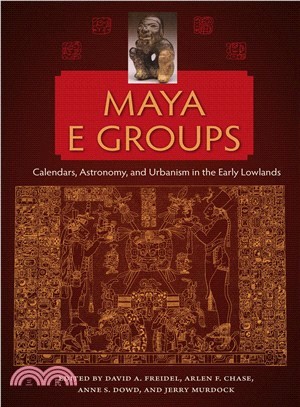Maya E Groups ─ Calendars, Astronomy, and Urbanism in the Early Lowlands
商品資訊
系列名:Maya Studies
ISBN13:9780813054353
出版社:Univ Pr of Florida
作者:David A. Freidel (EDT); Arlen F. Chase (EDT); Anne S. Dowd (EDT)
出版日:2017/08/08
裝訂/頁數:精裝/544頁
規格:24.1cm*15.9cm*4.4cm (高/寬/厚)
定價
:NT$ 7500 元若需訂購本書,請電洽客服 02-25006600[分機130、131]。
商品簡介
作者簡介
相關商品
商品簡介
“Leading archaeologists present the most recent evidence on a complex of architecture, iconography, and artifacts closely linked to the rise of the divine kingships of the ancient Maya. An important volume for anyone interested in the rise of ancient states.” —Arthur Demarest, author of Ancient Maya: The Rise and Fall of a Rainforest Civilization
“E Groups have proven to be older, more complex, and more variable than we might have anticipated even a generation ago. New data presented and interpreted here will inform the next generation of researchers and enthrall Maya enthusiasts everywhere.” —Debra S. Walker, editor of Perspectives on the Ancient Maya of Chetumal Bay
As complex societies emerged in the Maya lowlands during the first millennium BCE, so did stable communities focused around public squares and the worship of a divine ruler tied to a Maize God cult. “E Groups,” central to many of these settlements, are architectural complexes: typically, a long platform supporting three structures and facing a western pyramid across a formal plaza. Aligned with the movements of the sun, E Groups have long been interpreted as giant calendrical devices crucial to the rise of Maya civilization. This volume presents new archaeological data to reveal that E Groups were constructed earlier than previously thought. In fact, they are the earliest identifiable architectural plan at many Maya settlements.
More than just astronomical observatories or calendars, E Groups were a key element of community organization, urbanism, and identity in the heart of the Maya lowlands. They served as gathering places for emerging communities and centers of ritual; they were the very first civic-religious public architecture in the Maya lowlands. Investigating a wide variety of E Group sites—including some of the most famous like the Mundo Perdido in Tikal and the hitherto little known complex at Chan, as well as others in Ceibal, El Palmar, Cival, Calakmul, Caracol, Xunantunich, Yaxnohcah, Yaxuná, and San Bartolo—this volume pieces together the development of social and political complexity in ancient Maya civilization.
A volume in the series Maya Studies, edited by Diane Z. Chase and Arlen F. Chase
“E Groups have proven to be older, more complex, and more variable than we might have anticipated even a generation ago. New data presented and interpreted here will inform the next generation of researchers and enthrall Maya enthusiasts everywhere.” —Debra S. Walker, editor of Perspectives on the Ancient Maya of Chetumal Bay
As complex societies emerged in the Maya lowlands during the first millennium BCE, so did stable communities focused around public squares and the worship of a divine ruler tied to a Maize God cult. “E Groups,” central to many of these settlements, are architectural complexes: typically, a long platform supporting three structures and facing a western pyramid across a formal plaza. Aligned with the movements of the sun, E Groups have long been interpreted as giant calendrical devices crucial to the rise of Maya civilization. This volume presents new archaeological data to reveal that E Groups were constructed earlier than previously thought. In fact, they are the earliest identifiable architectural plan at many Maya settlements.
More than just astronomical observatories or calendars, E Groups were a key element of community organization, urbanism, and identity in the heart of the Maya lowlands. They served as gathering places for emerging communities and centers of ritual; they were the very first civic-religious public architecture in the Maya lowlands. Investigating a wide variety of E Group sites—including some of the most famous like the Mundo Perdido in Tikal and the hitherto little known complex at Chan, as well as others in Ceibal, El Palmar, Cival, Calakmul, Caracol, Xunantunich, Yaxnohcah, Yaxuná, and San Bartolo—this volume pieces together the development of social and political complexity in ancient Maya civilization.
A volume in the series Maya Studies, edited by Diane Z. Chase and Arlen F. Chase
作者簡介
David A. Freidel is professor of anthropology at Washington University in St. Louis. Arlen F. Chase is professor of anthropology at the University of Nevada, Las Vegas. Anne S. Dowd, principal archaeologist at ArchæoLOGIC USA, LLC, is coeditor of Cosmology, Calendars, and Horizon-Based Astronomy in Ancient Mesoamerica. Jerry Murdock is a member of the Board of Trustees for the Santa Fe Institute and the Aspen Institute.
主題書展
更多
主題書展
更多書展今日66折
您曾經瀏覽過的商品
購物須知
外文書商品之書封,為出版社提供之樣本。實際出貨商品,以出版社所提供之現有版本為主。部份書籍,因出版社供應狀況特殊,匯率將依實際狀況做調整。
無庫存之商品,在您完成訂單程序之後,將以空運的方式為你下單調貨。為了縮短等待的時間,建議您將外文書與其他商品分開下單,以獲得最快的取貨速度,平均調貨時間為1~2個月。
為了保護您的權益,「三民網路書店」提供會員七日商品鑑賞期(收到商品為起始日)。
若要辦理退貨,請在商品鑑賞期內寄回,且商品必須是全新狀態與完整包裝(商品、附件、發票、隨貨贈品等)否則恕不接受退貨。
























